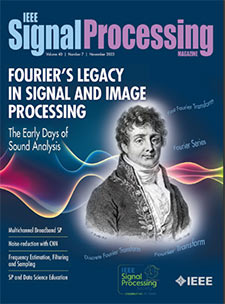- Our Story
- Publications & Resources
- Publications & Resources
- Publications
- IEEE Signal Processing Magazine
- IEEE Journal of Selected Topics in Signal Processing
- IEEE Signal Processing Letters
- IEEE/ACM Transactions on Audio Speech and Language Processing
- IEEE Transactions on Computational Imaging
- IEEE Transactions on Image Processing
- IEEE Transactions on Information Forensics and Security
- IEEE Transactions on Multimedia
- IEEE Transactions on Signal and Information Processing over Networks
- IEEE Transactions on Signal Processing
- IEEE TCI
- IEEE TSIPN
- Data & Challenges
- Submit Manuscript
- Guidelines
- Information for Authors
- Special Issue Deadlines
- Overview Articles
- Top Accessed Articles
- SPS Newsletter
- SigPort
- SPS Resource Center
- Publications Feedback
- Publications FAQ
- Blog
- News
- Dataset Papers
- Conferences & Events
- Community & Involvement
- Professional Development
- For Volunteers
- Information for Authors-OJSP
-
Home
Conferences Events IEEE JSTSP Article IEEE Signal Processing Magazine IEEE TIFS Article IEEE TMM Article IEEE TSP Article Jobs in Signal Processing Lectures Machine Learning Seasonal Schools Signal Processing News SPM Article SPS Distinguished Lectures SPS Newsletter Article SPS Webinar SPS Webinars SPS Webinar Series Webinar webinars
-
Our Story
What is Signal Processing?

The technology we use, and even rely on, in our everyday lives –computers, radios, video, cell phones – is enabled by signal processing. Learn More » -
Publications & Resources
-
SPS Resources
- Signal Processing Magazine The premier publication of the society.
- SPS Newsletter Monthly updates in Signal Processing
- SPS Resource Center Online library of tutorials, lectures, and presentations.
- SigPort Online repository for reports, papers, and more.
- SPS Feed The latest news, events, and more from the world of Signal Processing.
-
SPS Resources
-
Conferences & Events
-
Community & Involvement
-
Membership
- Join SPS The IEEE Signal Processing Magazine, Conference, Discounts, Awards, Collaborations, and more!
- Chapter Locator Find your local chapter and connect with fellow industry professionals, academics and students
- Women in Signal Processing Networking and engagement opportunities for women across signal processing disciplines
- Students Scholarships, conference discounts, travel grants, SP Cup, VIP Cup, 5-MICC
- Young Professionals Career development opportunities, networking
- Get Involved
-
Technical Committees
- Applied Signal Processing Systems
- Audio and Acoustic Signal Processing
- Bio Imaging and Signal Processing
- Computational Imaging
- Image Video and Multidimensional Signal Processing
- Information Forensics and Security
- Machine Learning for Signal Processing
- Multimedia Signal Processing
- Sensor Array and Multichannel
- Signal Processing for Communication and Networking
- Signal Processing Theory and Methods
- Speech and Language Processing
- Technical Working Groups
- More TC Resources
-
Membership
-
Professional Development
-
Professional Development
- Mentoring Experiences for Underrepresented Young Researchers (ME-UYR)
- Micro Mentoring Experience Program (MiME)
- Distinguished Lecturer Program
- Distinguished Lecturers
- Distinguished Lecturer Nominations
- Past Lecturers
- Distinguished Industry Speaker Program
- Distinguished Industry Speakers
- Distinguished Industry Speaker Nominations
- Industry Resources
- IEEE Training Materials
- Jobs in Signal Processing: IEEE Job Site
-
Career Resources
- SPS Education Program Educational content in signal processing and related fields.
- Distinguished Lecturer Program Chapters have access to educators and authors in the fields of Signal Processing
- PROGRESS Initiative Promoting diversity in the field of signal processing.
- Job Opportunities Signal Processing and Technical Committee specific job opportunities
- Job Submission Form Employers may submit opportunities in the area of Signal Processing.
-
Professional Development
-
For Volunteers
-
For Board & Committee Members
- Board Agenda/Minutes* Agendas, minutes and supporting documentation for Board and Committee Members
- SPS Directory* Directory of volunteers, society and division directory for Board and Committee Members.
- Membership Development Reports* Insight into the Society’s month-over-month and year-over-year growths and declines for Board and Committee Members
-
For Board & Committee Members
Popular Pages
Today's:
- Submit a Manuscript
- Information for Authors
- (ICASSP 2024) 2024 IEEE International Conference on Acoustics, Speech and Signal Processing
- Signal Processing Cup
- IEEE Transactions on Multimedia
- IEEE/ACM Transactions on Audio Speech and Language Processing
- IEEE Transactions on Image Processing
- (ICASSP 2025) 2025 IEEE International Conference on Acoustics, Speech and Signal Processing
- (MLSP 2024) 2024 IEEE International Workshop on Machine Learning for Signal Processing
- (SLT 2024) 2024 IEEE Spoken Language Technology Workshop
- Award Recipients
- Membership
- IEEE Signal Processing Letters
- IEEE Transactions on Information Forensics and Security
- Conferences & Events
All time:
- Information for Authors
- Submit a Manuscript
- IEEE Transactions on Image Processing
- 404 Page
- IEEE/ACM Transactions on Audio Speech and Language Processing
- IEEE Transactions on Information Forensics and Security
- IEEE Transactions on Multimedia
- IEEE Signal Processing Letters
- IEEE Transactions on Signal Processing
- Conferences & Events
- IEEE Journal of Selected Topics in Signal Processing
- Information for Authors-SPL
- Conference Call for Papers
- Signal Processing 101
- IEEE Signal Processing Magazine
Last viewed:
- Membership
- IEEE Transactions on Multimedia
- Governance Documents
- IEEE Transactions on Image Processing
- The Neural-SRP Method for Universal Robust Multi-Source Tracking
- SPS Scholarship Program
- About Transactions on Information Forensics and Security
- How MRIs are Changing How Society Looks at your Brain
- (ICIP 2025) 2025 IEEE International Conference on Image Processing
- Editorial Board
- Author Instructions For OJSP Reproducibility Review
- Submit a Manuscript
- IEEE Signal Processing Cup 2022
- IEEE Transactions on Information Forensics and Security
- Information for Authors
Gregory Allen (The University of Texas at Austin), “Computational Process Networks: A Model and Framework for High-Throughput Signal Processing” (2011)
You are here
Newsletter Menu
Newsletter Categories
Top Reasons to Join SPS Today!
1. IEEE Signal Processing Magazine
2. Signal Processing Digital Library*
3. Inside Signal Processing Newsletter
4. SPS Resource Center
5. Career advancement & recognition
6. Discounts on conferences and publications
7. Professional networking
8. Communities for students, young professionals, and women
9. Volunteer opportunities
10. Coming soon! PDH/CEU credits
Click here to learn more.
News and Resources for Members of the IEEE Signal Processing Society
Gregory Allen (The University of Texas at Austin), “Computational Process Networks: A Model and Framework for High-Throughput Signal Processing” (2011)
Gregory Allen (The University of Texas at Austin), “Computational Process Networks: A Model and Framework for High-Throughput Signal Processing” Advisor: Prof. Brian L. Evans (2011)
Many signal and image processing systems for high-throughput applications require concurrent implementations. These implementations should scale with increasing availability of computational elements, avoid deadlock, and produce consistent results (determinism). However, coarse-grained locks yield systems that do not scale well, and insufficient locking may cause non-determinate execution. In standard industry approaches, the programmer must try to resolve the tension among scalability, deadlock and determinism, which becomes increasingly difficult as software complexity grows. This dissertation presents the Computational Process Networks (CPN) model. CPN is built on a formal, mathematically provable model of concurrency, yields determinate execution, and naturally describes processing of streaming data samples, esp. sliding window algorithms. I also present a scalable implementation of the CPN model in C++ on multicore and distributed systems. Case studies include a high-performance 3-D sonar beamformer. Lastly, I develop a scalable, determinate algorithm to detect and resolve deadlocks in CPN and other process network models.
For details, please access the full thesis or contact the author.
Open Calls
Conference News
- Sensing Trends at ICASSP 2011: Expert Summaries of Current Trends Presented by TCs
- Call for Proposals to host MMSP 2013
- IEEE Meeting & Conference Management (MCM)
- Call for Papers: First IEEE International Conference on Emerging Signal Processing Applications
- Conference Call for Papers - June 2011
- Upcoming Conferences - June 2011
Society News
Publications News
Chapter & DL News
Research Opportunities
Initiatives & Trends
SPS on Twitter
- DEADLINE EXTENDED: The 2023 IEEE International Workshop on Machine Learning for Signal Processing is now accepting… https://t.co/NLH2u19a3y
- ONE MONTH OUT! We are celebrating the inaugural SPS Day on 2 June, honoring the date the Society was established in… https://t.co/V6Z3wKGK1O
- The new SPS Scholarship Program welcomes applications from students interested in pursuing signal processing educat… https://t.co/0aYPMDSWDj
- CALL FOR PAPERS: The IEEE Journal of Selected Topics in Signal Processing is now seeking submissions for a Special… https://t.co/NPCGrSjQbh
- Test your knowledge of signal processing history with our April trivia! Our 75th anniversary celebration continues:… https://t.co/4xal7voFER
Home | Sitemap | Contact | Accessibility | Nondiscrimination Policy | IEEE Ethics Reporting | IEEE Privacy Policy | Terms | Feedback
© Copyright 2024 IEEE – All rights reserved. Use of this website signifies your agreement to the IEEE Terms and Conditions.
A not-for-profit organization, IEEE is the world's largest technical professional organization dedicated to advancing technology for the benefit of humanity.








